Complete Solutions to Level 2 of chapter AROMATIC COMPOUNDS of Class 12 book with complete answers and questions
| Class 12 | CHEMISTRY |
| Chapter | AROMATIC COMPOUNDS |
| MS CHOUHAN | Level 2 |
| Number Of Questions | 26 |
| Academic Year | 2023-24 |
Each of the six compounds shown at the bottom of the page has two aromatic (benzene) rings. In each case the two rings are different and are labeled A & B. If an electrophilic substitution, such as nitration or bromination, is carried out on each compound, then identify which ring (A or B) will be preferntially attacked, and indicate the orientation of the substitution (orhto/para, meta or all sites)
`{:("Compound","Reactivity",,"Substitution",,"Compound","Reactivity",,"Substitution",,),(1,A,,"ortho/para",,2,A,,"ortho/para",,),(,B,,"meta",,,B,,"meta",,),(,,,"all sites",,,,,"all sites",,),(3,A,,"ortho/para",,4,A,,"ortho/para",,),(,B,,"meta",,,B,,"meta",,),(,,,"all sites",,,,,"all sites",,),(5,A,,"ortho/para",,6,A,,"ortho/para",,),(,B,,"meta",,,B,,"meta",,),(,,,"all sites",,,,,"all sites",,):}`
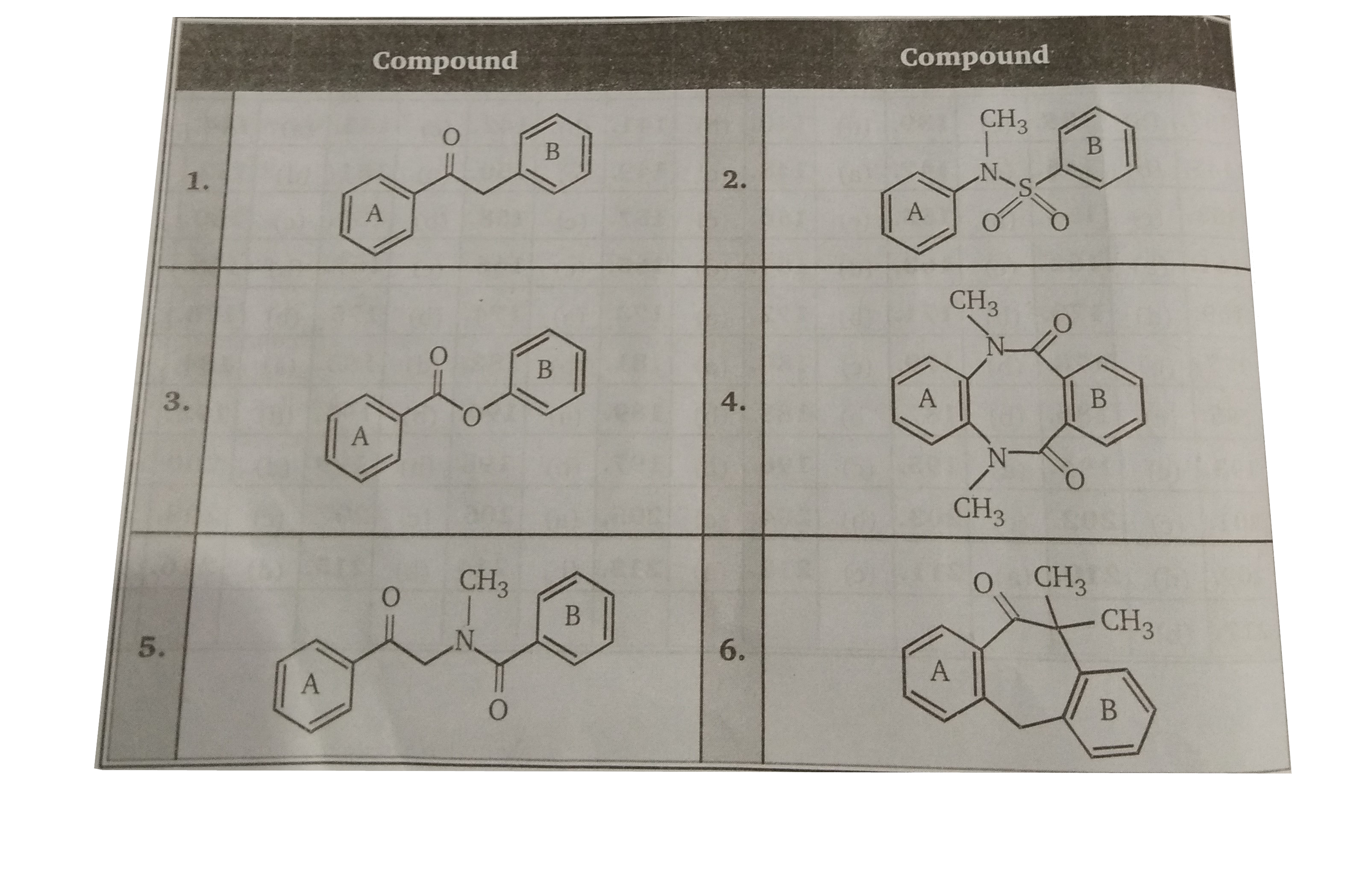
View SolutionWhen given substituents on a benzene ring, as activating or de-activating and as ortho-para or meta directing for electrophilic aromatic substitution fill the following by appropriate right or wrong.
`{:(,"Substituent","Activating","De-activating","Ortho/para","Meta",),(1,-OCH_(3),,,,,),(2,-overset(O)overset(||)(C)-O-CH_(3),,,,,),(3,-O-underset(O)underset(||)(C)- CH_(3),,,,,),(4,-CH_(3),,,,,),(5,-F,,,,,),(6,-Ph,,,,,),(7,-NH - overset(O)overset(||)(C) - CH_(3),,,,,),(8,-overset(O)overset(||)(C) - NH - CH_(3),,,,,),(9,-Br,,,,,),(10,-CN,,,,,),(11,-CF_(3),,,,,),(12,-overset(O)overset(||)(C) - NH_(2),,,,,),(13,-overset(O)overset(||)(C) - OH,,,,,),(14,-CH = CH_(2),,,,,),(15,-CH=CH-overset(O)overset(||)(C) - OH,,,,,),(16,-CH = CH - overset(O)overset(||)(C) - H,,,,,),(17,-S-Et,,,,,),(18,-underset(O)underset(||)(S)- Et,,,,,),(19,-underset(O)underset(||)overset(O)overset(||)(S) - Et,,,,,),(20,-N = O,,,,,),(21,-CH_(2)X,,,,,),(22,-CHX_(2),,,,,):}`
View SolutionDevise a series of reactions to convert benzene into meta-chlorobrombenzene. Select reagents and conditions from the following table, listing them in the order of use
`{:(,"Compound",,"Compound",,"Compound",),(1,"Sulphuric acid (conc.) heat",5,Mg "in ether",9,Cu_(2)Br_(2) + HBr,),(2,Cl_(2) + FeCl_(3) " and heat",6,PBr_(3),10,(CH_(3)CO)_(2)O + " Pyridine",),(3,NaNO_(2) +H_(3)O^((+)) 0^(@)C,7,H_(3)PO_(2),,,),(4,H_(2) " Pt catalyst",8,HNO_(3) ("conc.") + H_(2)SO_(4) ("conc.") " and heat",,,):}`
View SolutionMatch the column (I) and column (II). (Matrix)
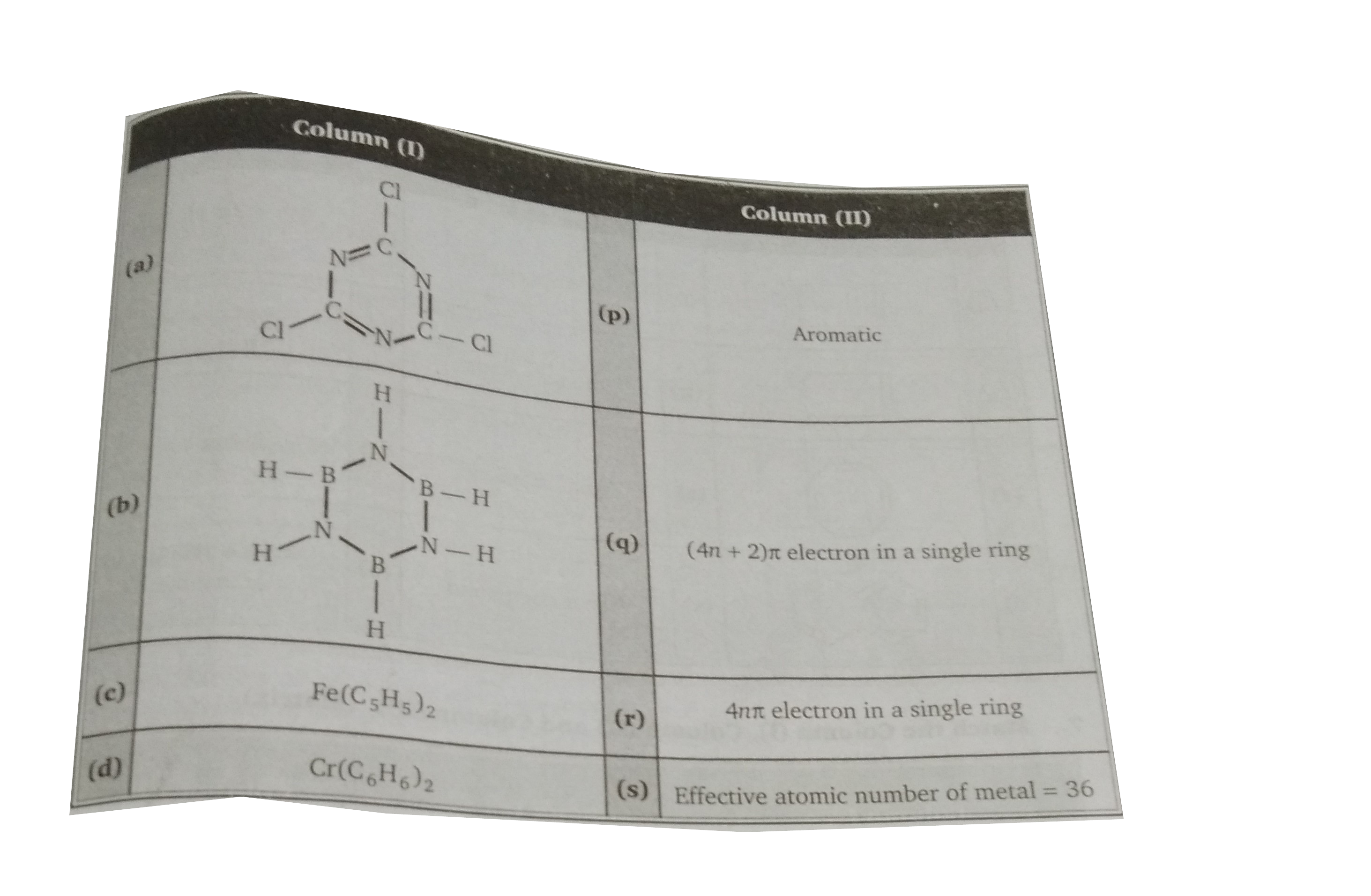
View SolutionMatch the colume (I) and column (II)
`{:(,"Column (I)",,"Column (II)",),(,"compound (Monocyckuc)",,"Number of " pi -"electrons",),((a),C_(4)H_(4)^(-2),(p),2pie,),((b),C_(4)H_(4)^(+2),(q),6pie,),((c),C_(9)H_(9)^(+1),(r),8pie,),((d),C_(9)H_(9)^(-1),(s),10 pie,):}`
View SolutionMatch the column (I), column (II) and column (III).(Matrix)
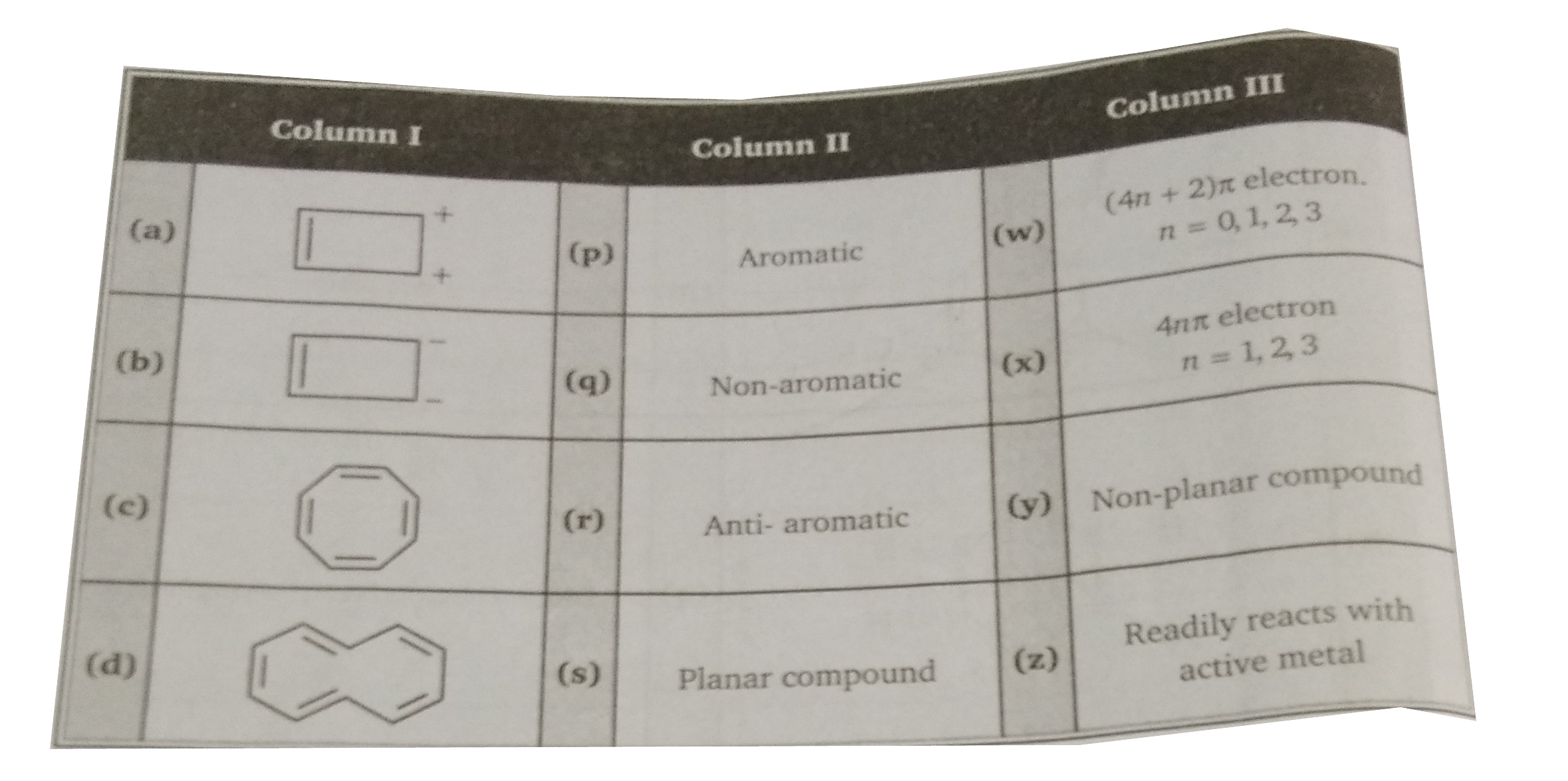
View SolutionMatch the column (I), Column (II) and Column (III) . (Matrix)
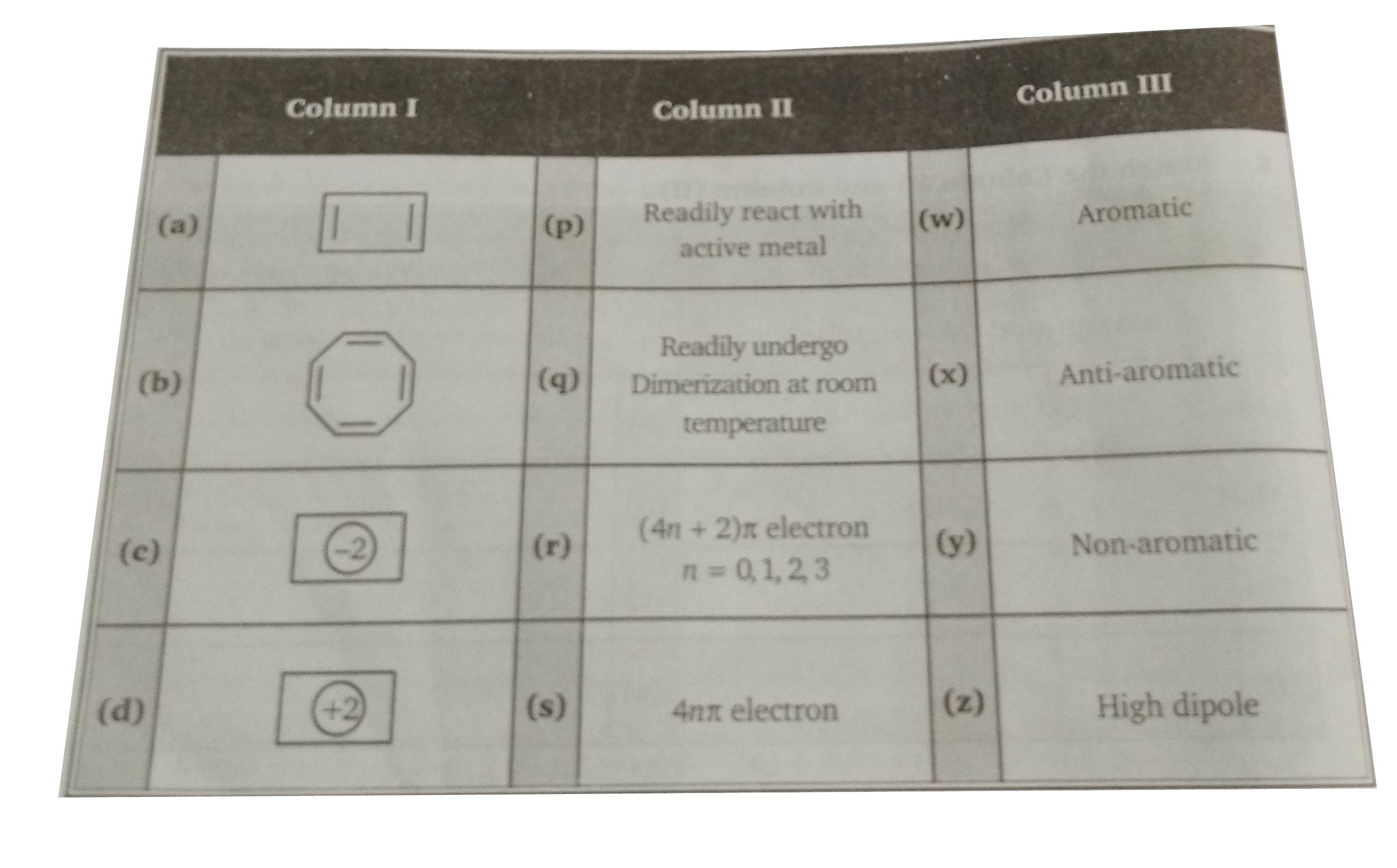
View SolutionAmong the following compound.

(a) Number of compounds which are aromatic = P
(b) Number of compounds which are anti-aromatic = Q
(c) Number of compounds which are non-aromatic = R
(d) Number of compounds which readily undergo dimerization at room temperature = S
(e) Number of compound which reacts with active metal = T
Sum of `P + Q + R + S + T=`
View SolutionOf the following compounds which will react with `Br_(2)` at room temperature in dark.
`{:((a),"Benzene "(C_(6)H_(6)),,),((b),"Cyclohexene " (C_(6)H_(10)),,),((c),"Cyclohexene " (C_(6)H_(12)),,),((d),"Propanoic Acid" (C_(2)H_(5)CO_(2)H),,),((e),"Phenol " (C_(6)H_(5)OH),,),((f),"Nitrobenzene" (C_(6)H_(5)NO_(2)),,),((g),"Hexyne " (C_(6)H_(10)),,),((h),2"," 2-"dichloropropane" (C_(3)H_(6)Cl_(2)),,):}`
View SolutionAmong the following compound.

(a) Number of compounds which are aromatic = w
(b) Number of compounds which are non-aromatic = x
(c) Number of compounds which are anti-aromatic = y
(d) Number of compounds which readily undergo Dimerzation at room temperature = z
Sum of `w + x + y + z =`....
View SolutionComlete the following table.

View SolutionGiven is the energy profile diagram of nitration of benzene using mixed acid. `(HNO_(3) + H_(2)SO_(4))`
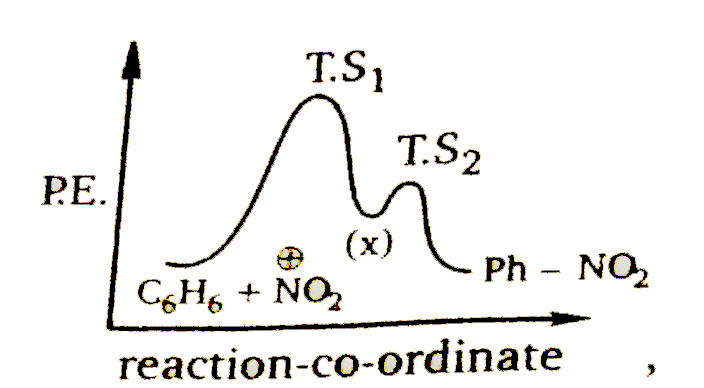
Identify (x) in above reaction:
View SolutionGiven is the energy profile diagram of nitration of benzene using mixed acid. `(HNO_(3) + H_(2)SO_(4))`
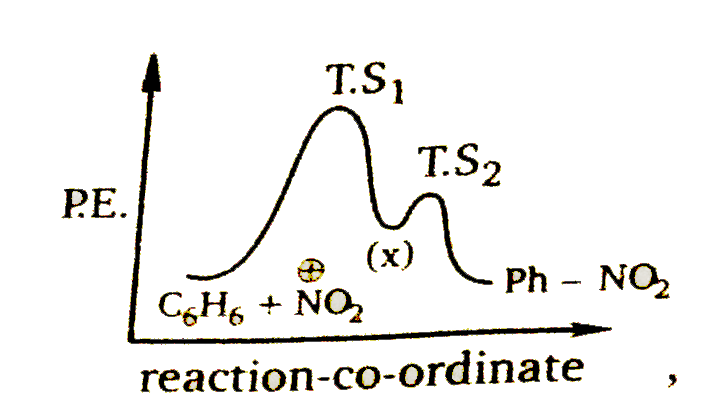
Identify `T. S_(1)` in the above reaction.
View SolutionGiven is the energy profile diagram of nitration of benzene using mixed acid. `(HNO_(3) + H_(2)SO_(4))`
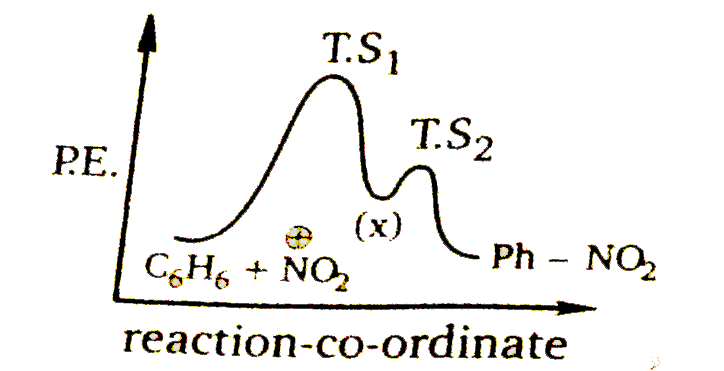
Identify `T.S_(2)` in the above reaction.
View SolutionExamine the ten structural formulas shown below and select those that satisfy each of the following conditions. Enter one or more letters (a through j) in each answer box, reflecting your choice for each.
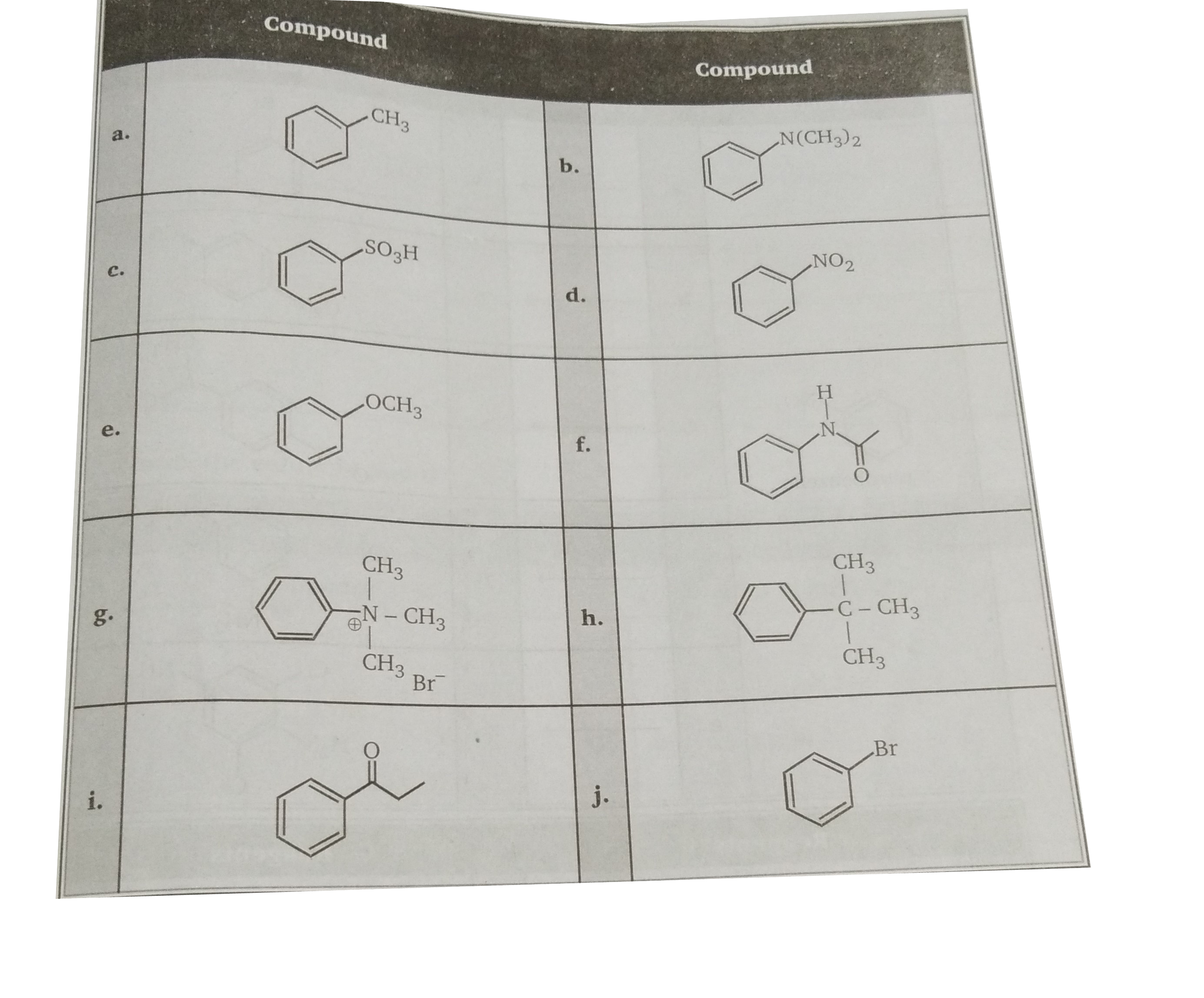
`{:(A,"Which compounds undergo electrophilic nitration more rapidly than benzene ?",,),(B,"Which compounds give meta substitution under electrophilic bromination conditions ?",,):}`
View SolutionNitrobenzene is a versatile compound that may be converted inot a wide variety of subsituted benzenes. Five such synthesis are shown below. In each reaction box above an arrow write letters designating the reagents and conditions, selected from the list at the bottom of the page, that would effect the transformation. The reagents must be written in the answer box in the correct order of their use. You may assume appropriate heating or cooling takes place, and more than one equivalent of the reagent may be used if needed.
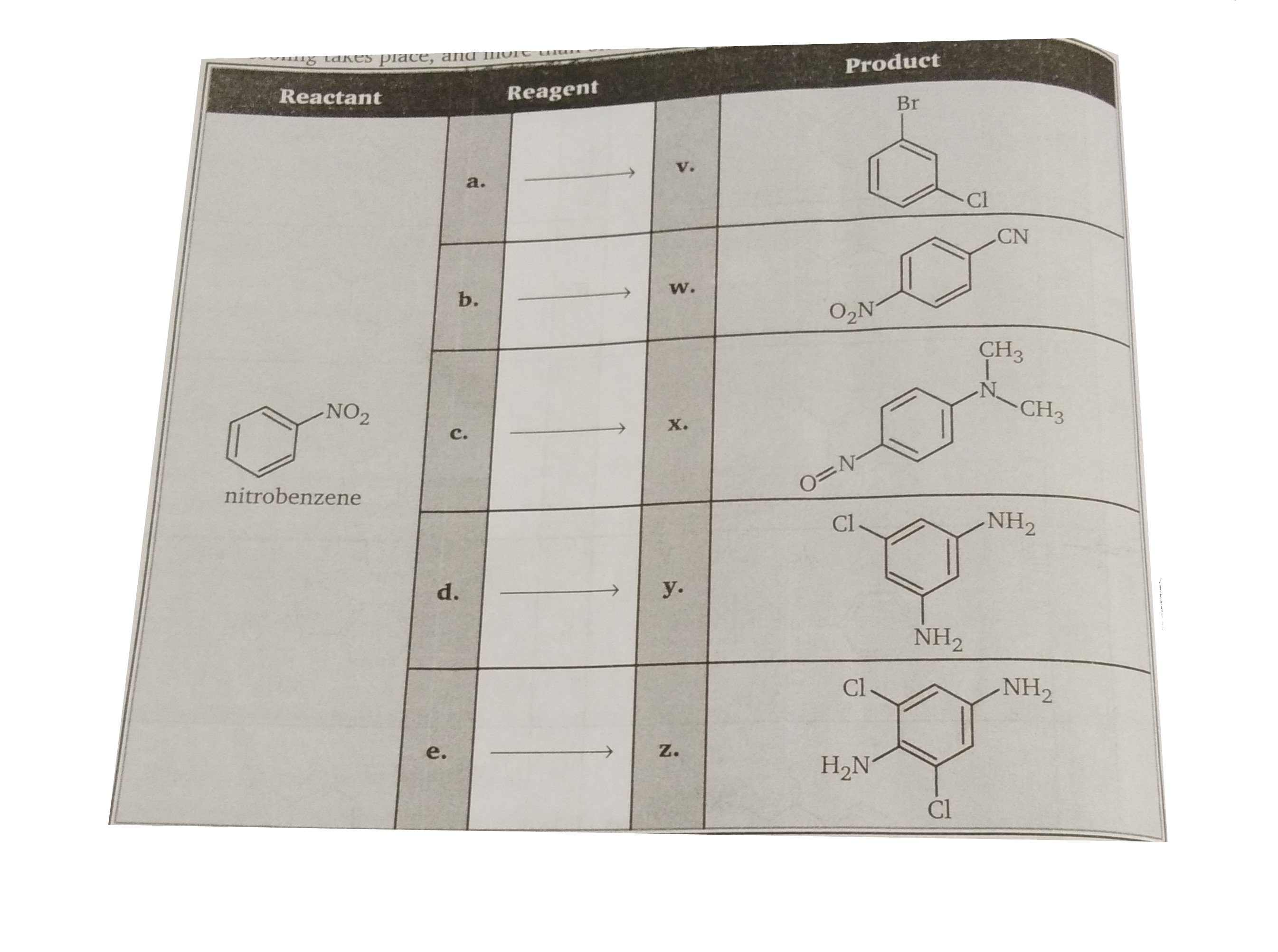
`{:(,"Reagents",,"Reagents",),(A,H_(2)","Ni "catalyst",F,Cl_(2) " & " FeCl_(3),),(B,KBr " & " Cu_(2) Br_(2),G,NaOH 10 % " solution",),(C,KCN " & " Cu_(2) (CN)_(2),H,(CH_(3)CO)_(2)O", pyridine",),(D,HNO_(2) 0^(@)C,I,HNO_(3)//H_(2)SO_(4),),(E,CH_(3)I " & pyridine",,,):}`
View SolutionMatch the column I and II
`{:(,"Column (I)",,"Column (II)",),(,"Group",,"Effect on phenyl ring",),((a),-CH = CH - CO_(2)H,(p),p//p - "directors",),((b),-O - overset(O)overset(||)(S) - CH_(3),(q),"meta-directors",),((c),-NH - overset(O)overset(||)(C) - CH_(3),(r),"Activating group",),((d),- underset(O)underset(||)(S) - CH_(3),(s),"De-activating group",):}`
View SolutionMatch the column I and II
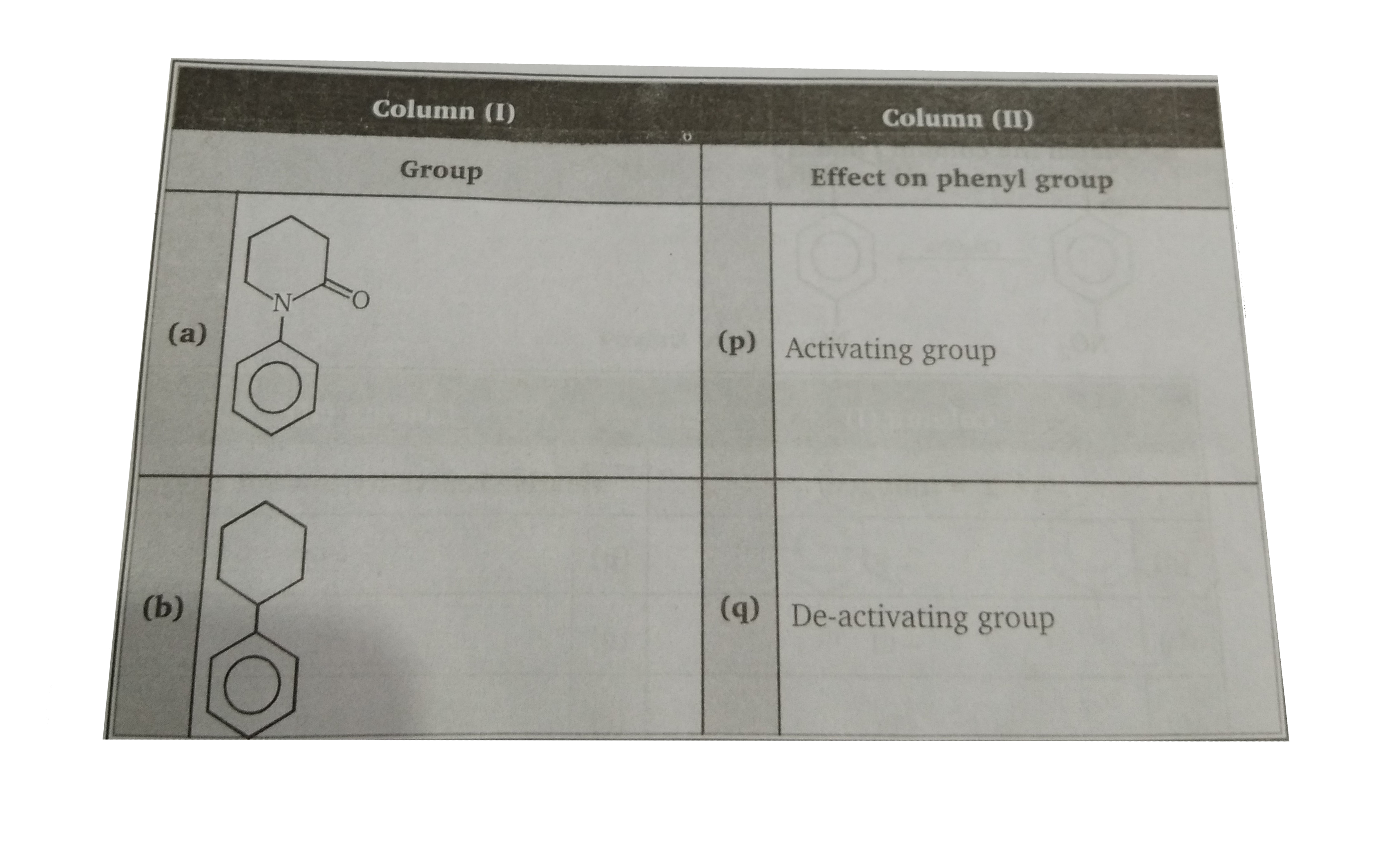
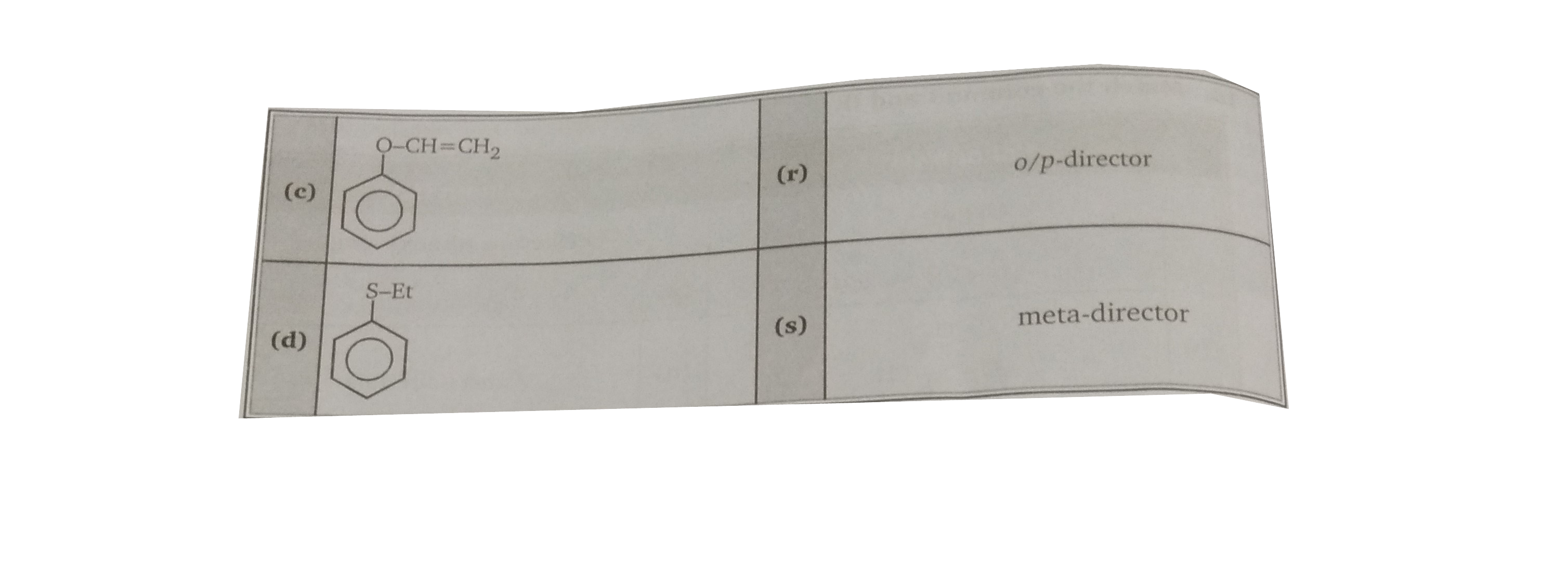
View SolutionNucleophilic Aromatic substitution `(SN_(Ar))`:
A substituted benzene derivative containing `- NO_(2)` and `Cl` group at `p-`position is subjected to `Nu-` substitution

Match the column I and II
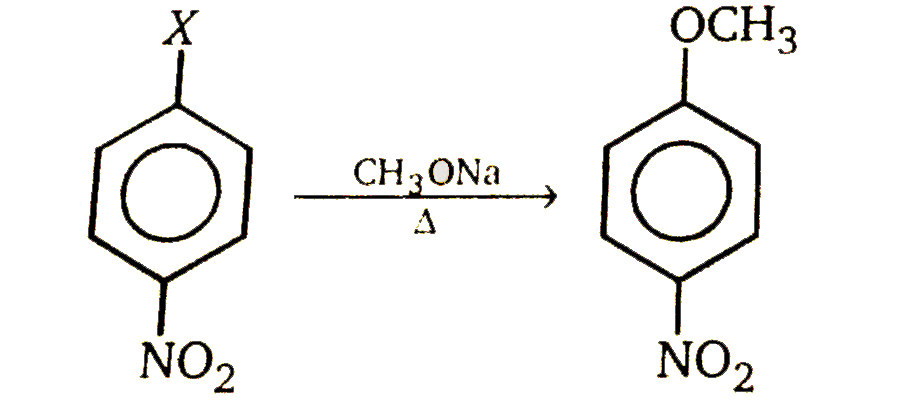
`{:(,"Column (I)",,"Column (II)",),(,X = "halogen",,"relative reactivity toward" (SN_(Ar)),),((a),-F,(p),312,),((b),-Cl,(q),1,),((c),-Br,(r),0.8,),((d),-I,(s),0.6,):}`
View SolutionNucleophilic Aromatic substitution `(SN_(Ar))`:
A substituted benzene derivative containing `- NO_(2)` and `Cl` group at `p-`position is subjected to `Nu-` substitution

If step -2 were rate determining step, which halogen of aryl halide is most reactive towards `SN_(Ar)`.
View SolutionNucleophilic Aromatic substitution `(SN_(Ar))`:
A substituted benzene derivative containing `- NO_(2)` and `Cl` group at `p-`position is subjected to `Nu-` substitution

Which of the following is most reactive towards `SN_(Ar)`
View SolutionNucleophilic Aromatic substitution `(SN_(Ar))`:
A substituted benzene derivative containing `- NO_(2)` and `Cl` group at `p-`position is subjected to `Nu-` substitution

 , Product (B) is:
, Product (B) is:
View SolutionNucleophilic Aromatic substitution `(SN_(Ar))`:
A substituted benzene derivative containing `- NO_(2)` and `Cl` group at `p-`position is subjected to `Nu-` substitution

 , Product (A) is:
, Product (A) is:
View SolutionNucleophilic Aromatic substitution `(SN_(Ar))`:
A substituted benzene derivative containing `- NO_(2)` and `Cl` group at `p-`position is subjected to `Nu-` substitution

The cumulative effect of their fluorine active the rings of penta and hexa fluorobenzene toward nucleophilic aromatic substitution. What is compound X in the following synthesis ?

View SolutionNucleophilic Aromatic substitution `(SN_(Ar))`:
A substituted benzene derivative containing `- NO_(2)` and `Cl` group at `p-`position is subjected to `Nu-` substitution

Which is the best route for the synthesis of Strating from benzen of ?
Strating from benzen of ?
View SolutionIdentify product (A) and write its structure.
`Ph - underset(Ph)underset(|)overset(Ph)overset(|)(CH) underset(AlCl_(3))overset(H^(+))rarr`
View Solution
Level 2 questions and complete solutions for chapter AROMATIC COMPOUNDS of MS CHOUHAN CHEMISTRY (HINGLISH) of Class 12
All Exercises from MS CHOUHAN Class 12 CHEMISTRY AROMATIC COMPOUNDS
- Additional Objective Questions (Integer Type)
- Additional Objective Questions (Linked Comprehension Type)
- Additional Objective Questions (Matrix Match Type)
- Additional Objective Questions (Single Correct Choice Type)
- Exercise
- Level 1 (Q.121 To Q.150)
- Level 1 (Q.181 To Q.210)
- Level 1 (Q.31 To Q.60)
- Level 2
- Solved Problem
- Subjective Problems